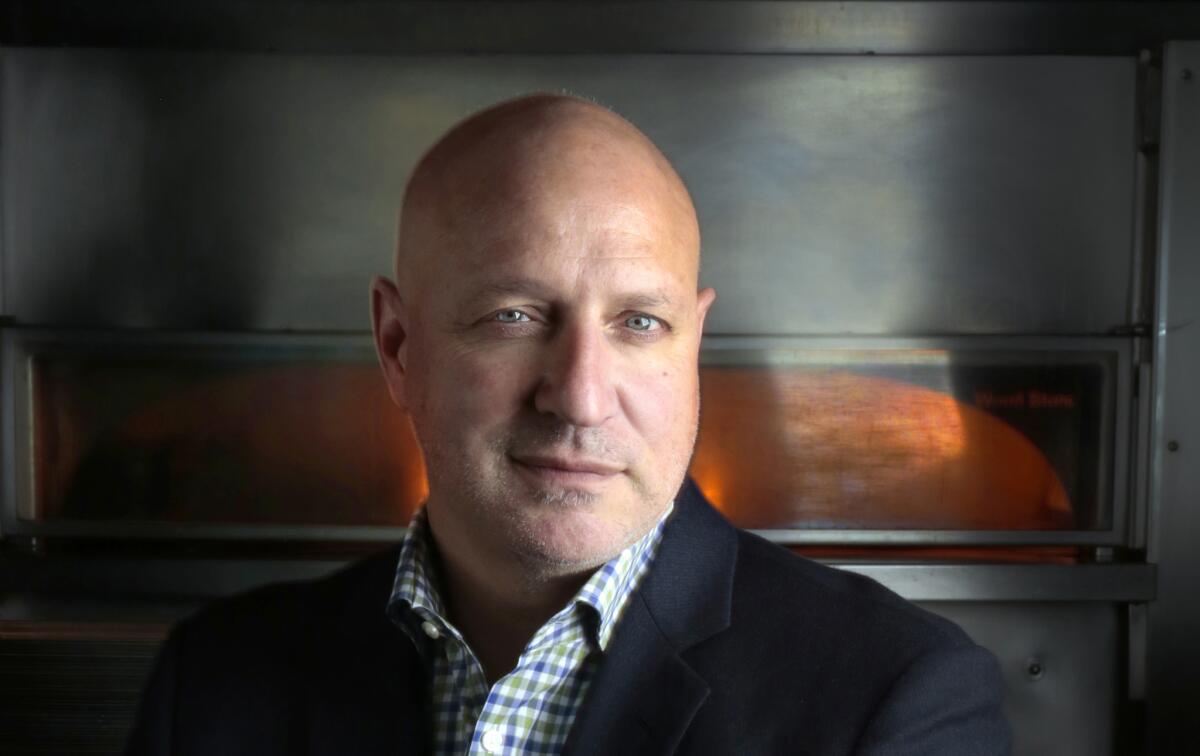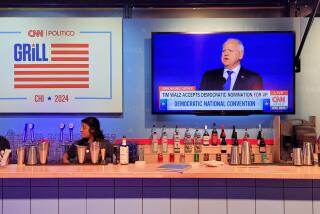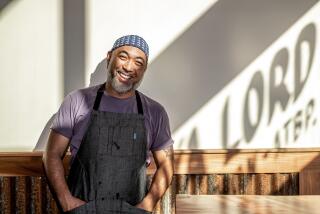‘Top Chef’s’ Tom Colicchio joining MSNBC as first food correspondent

Thanks to the reality TV series “Top Chef,” Tom Colicchio is one of the country’s most recognizable chefs and restaurateurs. He’s used his notoriety to bring attention to hunger in America, labeling genetically modified food and expanding free school lunch programs.
In the words of another well-known TV chef, he’s about to kick it up a notch. Colicchio is joining cable news channel MSNBC as its first food correspondent.
Colicchio is already a frequent guest on MSNBC programs; his formalized role marks the first time a major national TV news outlet has committed to covering what is known as the food movement as a regular beat. His segments and appearances will be seen with the channel’s lineup of progressive political talk hosts that include Rachel Maddow, Lawrence O’Donnell and Chris Matthews, and on “Morning Joe.” Colicchio will also have his own weekly half-hour show, “Stirring the Pot,” on MSNBC’s new online channel Shift this spring.
“This is a big deal,” said author Michael Pollan, whose work has been an influential force in food policy activism. “The fact is that people are deeply engaged by food stories, whether about food safety, nutrition, hunger, animal welfare, public health or the environment. Tom has a sufficiently broad grasp of the issues to connect the dots between food and all these issues.”
Colicchio is a major beneficiary of the foodie culture that started in the 1980s and exploded in the decades that followed thanks to cable channels like the Food Network and cooking competition shows. The James Beard Foundation winner will continue to be the demanding head judge on “Top Chef,” recently renewed for a 13th season on Bravo, and is also the host of the new Bravo series “Best New Restaurant.”
------------
For the Record
Feb. 17, 7:58: An earlier version of this post incorrectly stated that “Best New Restaurant” is a new CNBC series. The series is on Bravo.
------------
But he believes viewers can be engaged to care about food without watching contestants scramble to win a Quickfire challenge.
“It’s great that we have all these shows with chefs,” Colicchio said during a beef tongue lunch served at CraftBar, one of his eateries in Manhattan’s Flatiron District. “I think the next step is getting a little deeper than food as entertainment and looking more at the social issues around food. How it’s produced. The effect it has on the environment. When we started talking about hunger in America, most people we tell the numbers to are shocked. Now we need to have a more in-depth discussion about what it takes to get food from seeds to the table.”
The 52-year-old has been active in fundraising for hunger programs since breaking out as a culinary star on the New York restaurant scene in the early 1990s. His commitment became deeper after he executive produced “A Place at the Table,” a documentary film co-directed by his wife, Lori Silverbush, and released in 2013. The film depicts how changes in public policy have contributed to 50 million people having “food insecurity” in the U.S. after the federal government largely eradicated hunger in the 1970s.
In 2010, Colicchio testified before the House of Representatives in support of legislation to expand free school lunches (his mother, who taught him to cook, managed a school lunch program in Elizabeth, N.J., and told her son that she provided many of the children she served with their only meals of the day). In 2013, he spoke in opposition to a farm bill that would be funded by cuts to the food stamp program.
The combination of his celebrity stature and passionate interest in food policy has led politicians to seek his support for other related legislative initiatives. He now finds himself making trips to Washington, D.C., once a month.
Colicchio says he has tried to corral people dedicated to other food movement issues to get involved in hunger, as so many of the people affected don’t show up at the polls to vote.
“It’s not something I love doing, because it’s very frustrating,” he said. “But at a certain point, when you try to change things, you realize this is the only system we have.”
On MSNBC, Colicchio will have a regular segment in which he queries politicos for their views on food issues while being served a good meal. He’ll conduct catered chats with bold-faced names from other areas of public life as well.
MSNBC President Phil Griffin also envisions Colicchio out on the road, giving tips on how to eat more healthfully at fast food joints, or on a fishing boat with fellow angler Maddow to talk about ocean ecosystems.
Colicchio’s hiring is a first step at broadening the appeal of MSNBC.
Fox News, CNN and MSNBC have all seen their ratings erode as video news sources proliferate online and provide stiffer competition. But MSNBC’s year-to-year ratings tumble was particularly steep in 2014 — 17% among the 25-to-54 age group that advertisers seek when they buy news programming — a sign that viewers may be tiring of the Beltway-driven political dialogue that led to success in the previous years.
“We want to get outside the narrowness of Washington,” said Griffin. “I think these times are different than they were six years ago when we developed and exploded MSNBC. I want to stay true to the brand’s progressive sensibility. But the world is changing, and we’re trying to change with it.”
Although Colicchio’s approach will be different, MSNBC isn’t the first cable network to look to a chef for some ratings nourishment.
CNN has effectively used Anthony Bourdain to spearhead its move into original series programming. First-run episodes of Bourdain’s gastronomic travelogue “Parts Unknown,” which focuses on food and culture mostly in overseas locales, have delivered the largest audiences for any program on the channel since it debuted in 2013.
Griffin signed Colicchio, a big MSNBC fan, after hearing a pitch to have him host a weekly food-centric talk show on the channel. That’s not happening yet, but he will have a regular slot on Shift — MSNBC’s new streaming video service aimed at younger viewers who don’t typically watch cable news. Millennials are expected to be receptive to Colicchio’s program and segments, as they are often the catalyst for emerging food trends.
Although Colicchio will be part of a cable channel where the hosts’ point of view tilts heavily toward the Democratic Party, he contends that many of the topics he plans to cover can draw support from both sides of the political spectrum.
“I don’t think it’s partisan to want to make sure people aren’t hungry,” he said. “The question is how do we do it. The problem is we’re not having a real discussion about that.”
More to Read
The complete guide to home viewing
Get Screen Gab for everything about the TV shows and streaming movies everyone’s talking about.
You may occasionally receive promotional content from the Los Angeles Times.







